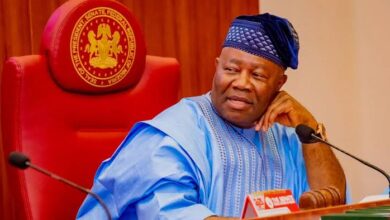
By Mustapha Lawal
The year 2024 is poised to subject democracy to an unprecedented and expansive examination. Widely acknowledged as the most significant election year to date, over 64 countries, encompassing half of the global population — approximately 4 billion people — are slated to conduct regional, legislative, and presidential elections.
The sheer scale of these electoral processes indicates a potential upheaval of political establishments and an escalation of geopolitical tensions on a global scale. The outcomes of these elections are expected to reverberate across international landscapes, shaping the future trajectory of numerous nations and influencing the geopolitical dynamics that define our world.
The Global Stakes Of The 2024 Elections
The looming U.S. presidential race in November is a pivotal global concern, with the potential for former President Donald Trump to secure a second term described as “” in 2024 by The Economist. Amid the United States turning its gaze inward, anticipating a potential clash between President Joe Biden and former President Donald Trump, a parallel global landscape is gearing up for significant political shifts.
Beyond America’s borders, nations are getting ready for potential leadership changes, disruptive public protests, and the rise of populist movements with the capacity to influence entire regions. Maria Ressa, Nobel Peace Prize laureate and founder of the investigative news site Rappler, starkly notes, “We will know whether democracy lives or dies by the end of 2024.”
In Europe, mainstream political parties are preparing for a potential upswing in far-right influence within the European Parliament, including Euroskeptic factions aiming to challenge the foundational principles of the EU.
In Asia, Taiwan’s election stands as a potential flashpoint in the Indo-Pacific, introducing heightened tensions that could involve Washington and other allies, amid the escalating disputes between Taipei and Beijing over the contested island. Who becomes the next president will fundamentally shape Beijing’s approach to the self-governed island it has repeatedly threatened with invasion.
While elections are scheduled in Bangladesh and Pakistan, concerns arise regarding their fairness. Bangladesh’s Prime Minister Sheikh Hasina is poised to secure a fourth consecutive term in January, but the election faces a boycott from the main opposition party due to a prolonged crackdown on political dissent. In Pakistan, former Prime Minister Imran Khan, a popular politician, is in jail, his party faces suppression, and his supporters are being arrested ahead of the February election, raising questions about the integrity of the electoral process in both countries.
Meanwhile, African nations such as Senegal, South Africa, Mali, and Chad are poised for elections that could significantly impact the trajectory of multilateral institutions across the continent.
Mexico is mirroring the United States in a closely watched presidential race, with potential repercussions on critical trade and complex border security issues with its northern neighbor. Tony Banbury, President of the International Foundation for Electoral Systems, recognizes the global trend, stating that while authoritarians are employing sophisticated strategies to consolidate power, democratic forces are mounting resistance.
Even in elections with expected outcomes, some factors make them significant. Vladimir Putin’s seemingly assured reelection campaign in Russia’s March presidential election may reveal insights into the extent of public support for the strongman, especially amid the ongoing conflict. In Ukraine, uncertainty looms over the 2024 presidential vote due to martial law, yet incumbent Volodymyr Zelensky plans to seek another term, and his high approval ratings add a layer of intrigue to the situation.
In the United Kingdom, political shifts are underway as the Conservative Party faces economic challenges after almost 14 years in power. Opinion polls indicate that the Labour Party is poised to emerge victorious in the upcoming general election, promised by Prime Minister Rishi Sunak to take place at some point in 2024. The bleak economic outlook contributes to the shifting political landscape in the UK.
The abundance of elections also raises pertinent questions about the influence of new technologies and online misinformation, placing cybersecurity and social media efforts under strain to counteract the risks of manipulation.
Snapshot Of Some Key Elections Scheduled For 2024 And What Their Outcomes Could Mean
Here’s a snapshot of some key elections scheduled for 2024, including countries, populations, election types, dates, and freedom and fairness scores based on expert assessments compiled from information by the National Democratic Institute, the International Foundation for Electoral Systems, and Anchor Change, among other sources, and ordered by population according to projections by the United Nations.
Here is a calendar of the elections taking place in 2024, and what their outcomes could mean according to The Standard.
January:
- Taiwan: On January 13, Taiwan faces elections that could shape its relationship with China, where the Democratic Progressive Party’s victory might escalate tensions.
- Finland: Presidential elections on January 28 may reflect Finland’s growing influence since joining NATO in response to Russia’s actions in Ukraine.
- Bangladesh: The January 7 parliamentary polls are overshadowed by political dissent and concerns about a fair election.
- Bhutan: Holding its fourth parliamentary election since becoming a democracy in 2008, Bhutan emphasizes “gross national happiness” as a growth indicator.
- The Comoros: Presidential elections on January 14 face opposition claims of preorchestrated outcomes.
- Tuvalu: General elections on January 26 coincide with Prime Minister Kausea Natano’s climate change treaty with Australia.
February:
- South Africa: The ANC’s longstanding majority is challenged as South Africa grapples with the aftermath of apartheid, crime, unemployment, and corruption scandals.
- Belarus: Post2020 elections, Belarus experiences its first polls, marked by a crackdown on dissenting voices.
- Pakistan: Economic, political, and security crises set the stage for Pakistan’s elections, involving controversies around Imran Khan’s imprisonment.
- Senegal: With President Sall stepping down after two terms, Senegal anticipates a new leader following constitutional term limits.
- Azerbaijan: A snap presidential election on February 7 is expected to extend President Aliyev’s rule after military successes in Nagorno-Karabakh.
- Indonesia: On February 14, Indonesia holds the world’s largest single-day election, likely securing the Indonesian Democratic Party of Struggle’s victory.
- Dominican Republic: General elections are set for February 18 and May 19, covering municipal, presidential, and congressional elections.
March:
- Iran: Amidst protests and conservative dominance, Iran’s elections face disqualifications and potential boycotts.
- Russia: The March 2024 elections, dominated by Putin, raise concerns about democracy, marred by media control and previous allegations of fraud.
- Ukraine: Debates persist on holding a March 2024 presidential election amid martial law due to Russia’s invasion.
- Portugal: A snap parliamentary election on March 10 follows Prime Minister Costa’s resignation amid a corruption investigation.
- El Salvador: An already controversial election in October 2023 involves President Bukele’s reelection bid, challenging constitutional limits.
April:
- India: Spring elections pose challenges for Modi’s BJP amid economic growth but criticism of authoritarianism.
May:
- Panama: Presidential elections focus on opposition to a mining deal, influencing the political landscape.
- Lithuania: May 12 witnesses presidential elections and a referendum on multiple citizenship
June:
- Belgium: Elections on June 9 feature concerns about far-right Vlaams Belang’s rise amid migration issues.
- Mexico: June 2 sees general elections where Claudia Sheinbaum leads the polls.
- Iceland: Presidential elections on June 1 involve incumbent Gudni Jóhannesson considering a third term.
July:
- Rwanda: July 15–16 elections feature President Kagame seeking reelection amid criticism of political suppression.
September:
- Austria: The September 30 elections may witness a rightwing, populist government, reflecting European trends.
- Croatia: Elections by September 22 address rising living costs amid political debates.
October:
- Mozambique: October 9 elections cover legislature, provincial assemblies, and governors amid ongoing insurgency.
November:
- United States: On November 5, the 60th US presidential election raises anticipation of Trump’s return and potential global impact.
- Tunisia: The November 24 elections revolve around migration and economic crisis concerns.
December:
- South Sudan: Economic challenges and a fragile political environment surround December polls.
- Algeria: December elections follow leadership changes but face criticisms of suppression and lack of progress.
- Ghana: Economic troubles dominate the December 2024 elections as Ghana faces a challenging economic situation.
Date Unconfirmed:
- United Kingdom: Prime Minister Rishi Sunak suggests a 2024 general election, anticipating a shift in political dynamics.
- Namibia: Swapo’s Deputy Prime Minister Netumbo NandiNdaitwah is a front runner in the 2024 presidential and national elections.
- Togo: Legislative and regional elections by Q1 2024 may witness challenges to the ruling UNIR party.
- Sri Lanka: Presidential elections are expected before September 2024, with President Wickremesinghe eligible for a second term.
- Venezuela: Upcoming presidential elections in late 2024 raise expectations of fairness with the government inviting international observers.
- Slovakia: Presidential elections by April 2024 will not see the reelection of President Čaputová.





Hi, this is a comment.
To get started with moderating, editing, and deleting comments, please visit the Comments screen in the dashboard.